English is a challenging language to learn, even for native speakers. For non-native English speakers, it can be even more difficult to master. While some words may come easily, others can be quite tricky. In this blog post, we’ll take a look at some of the most difficult words to practice for non-native English speakers. We’ll discuss their meanings, origins, and usage, as well as provide tips and tricks for mastering them. So grab a pencil and a notebook, and let’s get started!
Here are 20 Difficult Words To Practice For Non-Native English Speakers
Liaison
Regarding pronunciation, the word liaison often confuses non-native speakers. It is pronounced as “lee-ay-zawn” It is a French word and comes from the Latin word “ligare,” which means “to bind.”
This word is used to refer to a person or organization that serves as a link or connection between two or more people or groups.
For example, a school liaison serves as a connection between a school and the community. They may help with recruiting students and organizing events for the school. Similarly, an embassy liaison is someone who connects an embassy to the government of its host country.
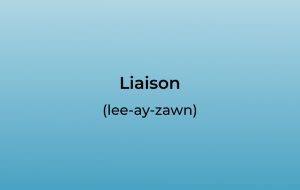
Antecedent
Pronouncing English words correctly can sometimes be tricky. The word antecedent is no exception. The antecedent is pronounced an-ti-see-dent. The emphasis is placed on the middle syllable, with the emphasis on the “ti.” The first syllable is short, and the third syllable is longer.
The word antecedent has multiple meanings in English. It can be used as a noun, adjective, or adverb. As a noun, it refers to a person, event, or thing that came before something else. For example, “The antecedent of the modern computer was the abacus.”

Perspicacious
Pronouncing the English word ‘perspicacious’ can be difficult, especially if you’re not used to such complex words. The word is derived from the Latin root ‘perspicax,’ which means ‘sharp-sighted.’ The correct pronunciation of the word is ‘per-spuh-KAY-shuhs.’
The word ‘perspicacious’ is an adjective that means ‘having or showing keen mental discernment and good judgment.’ It can also be used to describe someone who is ‘clever or insightful.’ Here’s an example of how you can use the word in a sentence:
‘He was a perspicacious businessman, able to identify opportunities in the market and capitalize on them quickly.’
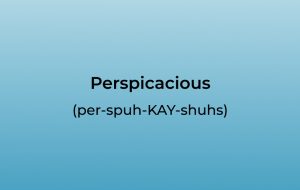
Incognito
The word incognito is pronounced “in-KAHN-toh” or “in-KAHN-tee-oh.” The emphasis is on the second syllable, so it should sound like “in – KAHN – tee – oh.”
Let’s understand what incognito means. Incognito is an adjective used to describe someone or something that is not easily seen or identified, such as a person wearing a disguise.
For example, you might say, “She went incognito with a wig and sunglasses, so no one recognized her.”

Supercilious
The word supercilious is an adjective with a negative connotation meaning haughty, arrogant, or condescending. It is derived from the Latin word ‘supercilium,’ which means eyebrow or forehead, and is used to describe someone who believes they are superior to others. To pronounce the word ‘supercilious’ correctly, the emphasis should be placed on the first syllable, and the ‘i’ should be pronounced as a short ‘i’ sound. The word is pronounced ‘soo-pur-SILL-ee-us.’
For example, if someone is talking to you in a superior or condescending tone, you could describe their attitude as being ‘supercilious.’

Ineffable
Ineffable is an adjective derived from the Latin word ‘ineffabilis,’ and it means ‘unspeakable’ or ‘indescribable.’ It is used to describe something too great, powerful, or beautiful to be expressed in words. It is usually used to describe feelings or experiences which are so profound that words are not sufficient. The correct pronunciation for this word is ‘in-eh-fah-buhl.’ The syllables are broken down as follows, ‘in’ (rhymes with ‘bin’), ‘eh’ (rhymes with ‘bed’), ‘fah’ (rhymes with ‘car’), and ‘buhl’ (rhymes with ‘pull’).
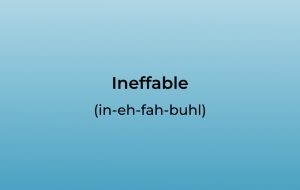
Sagacious
Sagacious is an adjective from the Latin word sagax, which means “wise.” This adjective describes someone wise, discerning, or has good judgment. People commonly use it in formal contexts. To pronounce sagacious correctly, you should break it down into two syllables. Pronounce the first syllable “sa” like the “s” in “salt.” The second syllable “ga” like the “g” in “go,” and the final sound “shus” like the “sh” in “shoe.” Put the syllables together to pronounce the word as “suh-GAY-shus.”
For example, you could say that a sagacious decision-maker can assess a situation quickly and come to the right conclusion.
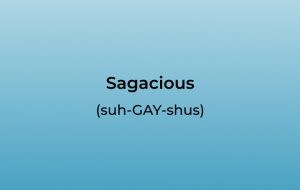
Ennui
Ennui is a French word that means a feeling of weariness, boredom, and dissatisfaction. Pronounce it “ahn-wee,” with the “e” sounding like the “a” in “cat.” Pronounce the “n” like the “n” in “nice,” and pronounce the “ui” like the “ee” in “see.” You can use this word in a sentence to emphasize a general feeling of apathy, depression, or listlessness.
For example, John decided to take a break at the beach because he was filled with ennui.

Serendipitous
The word serendipitous describes a pleasant surprise or an unexpected discovery. Pronounce the English word “serendipitous” as “suh-ren-DIP-uh-tus.” The “suh” part of the pronunciation sounds like the “suh” in “sushi.” The “ren” part of the pronunciation sounds like the “ren” in “rendezvous.” The “DIP” part of the pronunciation sounds like the “dip” in “dipped.” The “uh” part of the pronunciation sounds like the “uh” in “uh-huh.” The “tus” part of the pronunciation sounds like the “tus” in “dust.”
We can use this word in a sentence like: We stumbled upon this beautiful park serendipitously while walking around the city.

Fastidious
Emphasize the first syllable, “fast,” when pronouncing the word fastidious. Slightly draw out the “i” sound and emphasize the “d” sound when pronouncing the word “fastidious.” That leaves the pronunciation at “fuh-STI-dee-uhs.”
For example, if you were describing someone who was a meticulous perfectionist, you could say, “She’s very fastidious about her work.” She pays close attention to details and strives for perfect results.
English words that you can practice to help you pronounce fastidious include meticulous, exacting, nit-picky, and conscientious. By focusing on the syllables and the proper pronunciation of each word in these terms, you’ll be able to better speak fastidious in no time.
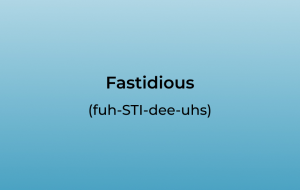
Conundrum
The word ‘conundrum’ is a noun and is pronounced ‘KAHN-uhn-drum.’ It is an interesting word used in English for centuries and remains a popular term today. A conundrum is a type of riddle or puzzle difficult to solve. It is generally posed as a question and is often humorous.
For example, “What has four legs but cannot walk?” is a classic conundrum. The answer is a chair.

Quixotic
The correct way to pronounce quixotic is “kwih-ZAH-tick.” The word originates from the Spanish word “Quijote,” the protagonist’s name in the novel Don Quixote by Miguel de Cervantes. The definition of quixotic is “pursuing idealistic goals in a foolishly impractical manner.” In other words, We can use it to describe someone who is overly optimistic and unrealistic.
For example, you can say that he had an admirable but unlikely-to-be-achieved quixotic dream to save the world from poverty. This sentence describes the person’s unrealistic dream as quixotic.

Ephemeral
The correct pronunciation of ephemeral is ‘eh-fem-er-uhl.’ Start with the ‘eh’ sound at the beginning, like in the word ‘egg.’ Then, quickly move to the ‘f’ sound, like in the word ‘fun.’ After that, the ‘eh’ sound repeats, but with a slightly longer sound. Then, say the ‘muh’ sound, like in the word ‘mug.’ Lastly, the ‘ral’ ending is said like ‘rahl.’
Ephemeral is an adjective that describes something short-lived or temporary. It comes from the Greek word ‘ephēmeros,’ which means ‘lasting only one day.’ An example of this word in a sentence would be, “The ephemeral nature of the summer made it seem like it passed by in the blink of an eye.”

Obfuscate
The English word “obfuscate” means to make something difficult to understand or unclear. People use circumlocution when they want to avoid giving a direct answer or trying to avoid being understood. To pronounce it correctly, place the stress on the second syllable, “fusc.” Pronounce the final “ate” with a long “a” sound. Therefore, the correct pronunciation of “obfuscate” is “uhb-FUS-kayt.”
Here’s an example sentence: “The politician designed their use of language to obfuscate the truth.”
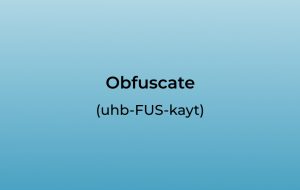
Mellifluous
Mellifluous is an adjective that describes something as having a smooth and sweet sound. The Latin words “mel,” meaning honey, and “fluens,” meaning flowing, are the source of the word. As a result, you can interpret it literally as “honey-flowing.” To pronounce this word correctly, place the emphasis on the first syllable, “mel.” Pronounce the “l” in “mellifluous” as a soft, gentle “l,” and pronounce the “ous” with a drawn-out sound. The word should sound like “muh-LIF-loo-uhs.” Mellifluous can describe birds singing, a stream of water, or even a person’s voice.
For example, “Her singing was so mellifluous that it could soothe even the most troubled hearts.”
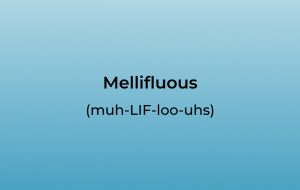
Anachronistic
Anachronistic is an adjective that describes something out of place in time. The Greek word anachronismos, which means out of time, derives from it. An example of anachronistic would be someone talking about a time machine in the middle of a medieval-era village.
To pronounce the word anachronistic, break it down into its three syllables an-a-chron-is-tic. Pronounce each syllable separately with equal emphasis. The “a” in anachronistic like the word “ah,” and pronounce the “ch” like the “ch” in “cheese”. Pronounce the “ron” in “anachronistic” like the “ron” in “iron”, and pronounce the “tic” like the “tic” in “rhythmic”. Once you have the pronunciation down, practice saying the word in sentences.
For example, “The idea of a time machine is anachronistic for the medieval-era village.”

Propinquity
Propinquity is a noun that has its roots in Latin and means “nearness in relationship or position.” People use it to refer to something or someone who is close in proximity or relationship. For example, you could describe a propinquity between two people as a close affinity or bond between them.
To correctly pronounce propinquity, break it down into syllables. The word has four syllables – pro-pin-qui-ty. Pronounce the first syllable, “pro,” like the word “pro.” Pronounce the second syllable, “pin,” like the word “pin.” The third syllable, “qui,” like the word “quay.” And the last syllable, “ty,” is pronounced like the word “tee.”
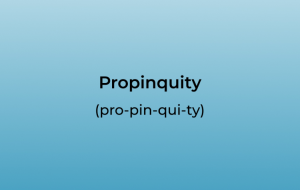
Enigmatic
Enigmatic means something that is mysterious, puzzling, or difficult to understand. We can label objects, situations, and people as “enigmatic.” When you say enigmatic, the emphasis is on the first syllable: en-IG-mat-ik. Pronounce the letter G in the middle of the word like the J sound. The final K will sound like a hard C sound.
Here’s an example of using it in a sentence: “The professor’s lectures were always enigmatic.”

Obtuse
The word “obtuse” is an adjective that means not sharp or pointed, not acute, or blunt. It can also describe an individual who is not intelligent or quick to understand.
It’s pronounced, “ob-TOOSS.” The emphasis is on the “O” syllable, and the “S” is slightly longer. The “B” sound is very subtle or almost silent.
Here’s an example of how to use the word “obtuse” in a sentence: “He was so obtuse that he didn’t understand what I meant.”

Recalcitrant
The word “recalcitrant” is pronounced as re-kal-si-trant. This challenging word comprises five syllables, with the primary accent on the second syllable. To practice your pronunciation, you can break it down into sections. Pronounce the first syllable as “re,” followed by “kal,” “si,” “trant,” and lastly, “re-kal-si-trant.” Recalcitrant” is an adjective that means someone or something difficult to manage, stubbornly resisting authority or control. This can also describe behavior that is resistant to change or progress.
To help you understand the definition better, here’s an example sentence that uses this word: “The school suspended the recalcitrant student for refusing to follow the rules.”

To sum up
Mastering the English language can be a difficult challenge for non-native speakers and requires understanding the meanings, origins, and usage of some of the most difficult words. While it may take some time and effort to master these words, the rewards are well worth the effort. You can conquer these words with a good understanding of their meanings, origins, pronunciation, and usage. Non-native speakers can use English improvement apps to become more confident and communicate effectively in the English language








